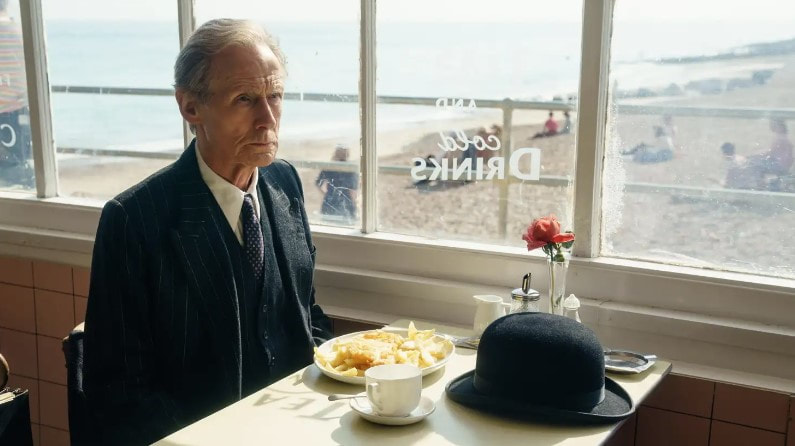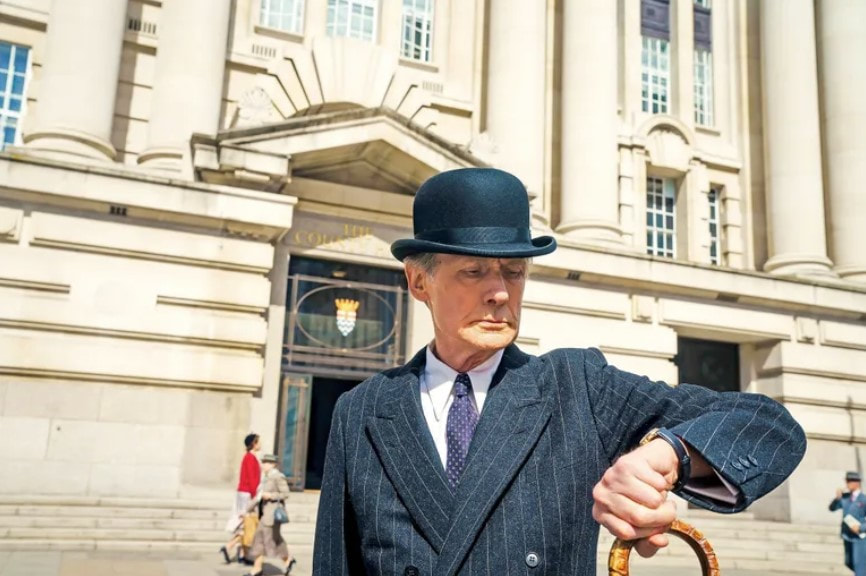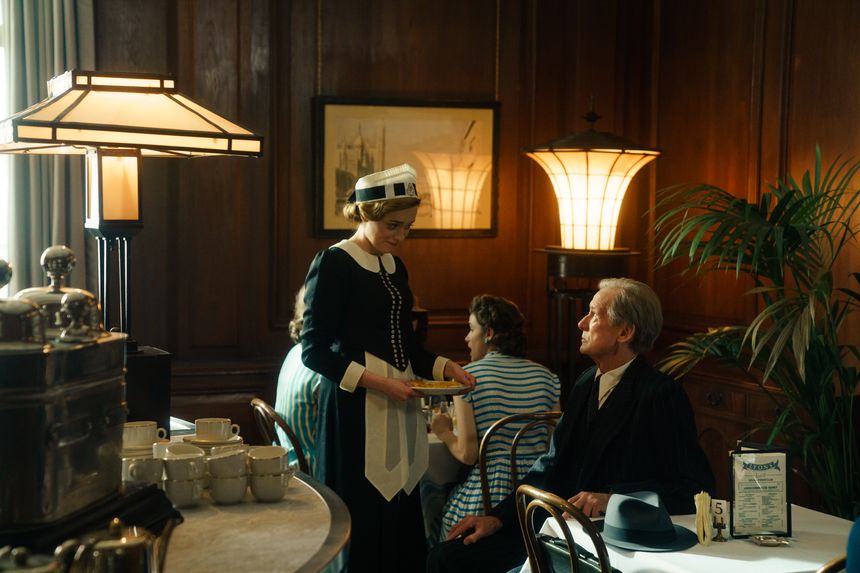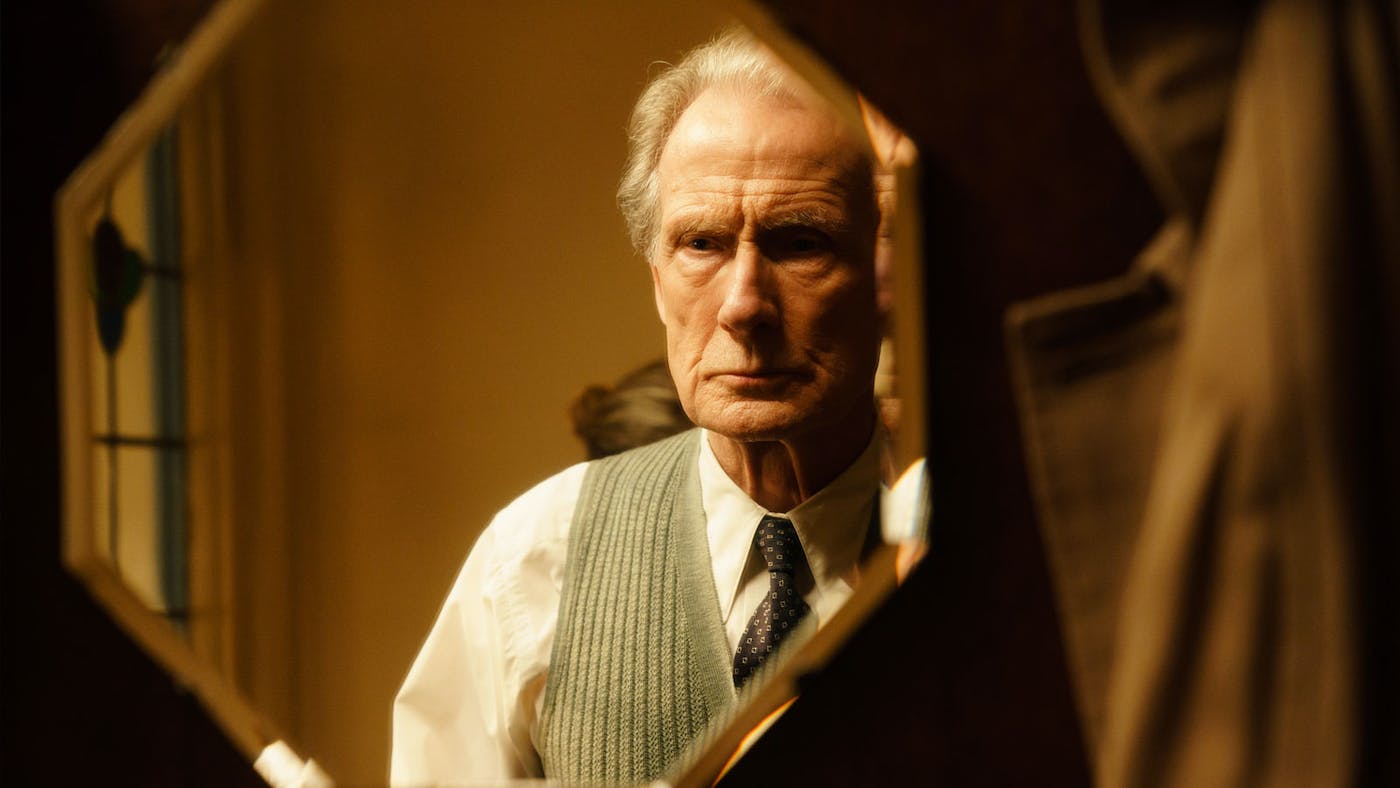CAST & CREW
Directed by Oliver Hermanus
Featuring Bill Nighy, Adrian Rawlins, Aimee Lou Wood
Rating: Not Rated
Runtime: 102 min
Directed by Oliver Hermanus
Featuring Bill Nighy, Adrian Rawlins, Aimee Lou Wood
Rating: Not Rated
Runtime: 102 min

Reviewed by Phil de Semlyen | Time Out
Bill Nighy puts in a career-best performance in an emotionally searing redo of Kurosawa’s Ikiru
Few actors can connect with an audience like Bill Nighy, who has a rare knack for salvaging even turkeys with his wry charm and a conspiratorial glint that seems to say: ‘Nonsense, isn’t it? But quite fun too, don’t you think?’ Who else could hold the screen as a flappy-faced CG squid man, à la Pirates of the Caribbean, or bring a touch of arch devilry to the bin fire that is Underworld: Rise of the Lycans? But when the material is genuinely worthy, as it is in this sublime remake of Akira Kurosawa’s 1952 masterpiece Ikiru, he can really soar.
Nighy has never been better than in this richly rewarding ’50s-set drama about a repressed and terminally ill man who discovers life just as it comes to an end. He communicates its cargo of hope and sadness in his every soft-spoken aside; each subtle facial twitch betraying deeply buried emotions, like fault lines hinting at some vast subterranean earthquake. His performance is minimal, often quite brilliant, and may well leave you a sobbing mess.
That trademark Nighy eyebrow raise is nowhere to be found in his lugubrious civil servant, Mr Williams. He’s the kind of man The Kinks might have written a song about: a creature of routine who catches the same train every morning to the same desk inside a maze-like London municipal building, where he bows his head and shuffles applications for various projects, including a new children’s playground being doggedly pursued by three frustrated women, filing them away in a dusty in-tray with a soothing ‘there, it can do no harm’ as if he’s euthanising them.
And of course, that’s exactly what he’s doing – and himself, too.
If you’ve seen Ikiru, which Nobel-winning novelist Kazuo Ishiguro reworks here with just the right blend of fealty and freshness in a rare screenwriting effort, you’ll know Mr Williams’s destiny involves both a cancer diagnosis and that playground – and one swing, in particular. If you haven’t, think of him as a kind of bureaucratic, pin-stripped Ebenezer Scrooge – albeit more reined in and less enraged in his denial of joy.
Bill Nighy’s performance may well leave you a sobbing mess
Living is overwhelming a film of interiors – stuffy offices, seaside cafés, bawdy pubs – but South African director Oliver Hermanus jazzes them up with the same visual artistry he brought to his terrific queer bootcamp drama Moffie. Alongside that of Kurosawa, Living wears the influence of postwar British cinema on its pinstriped sleeve, right down to the newsreel footage of its opening and the emotional swells of Dvořák and Vaughn Williams.
Hermanus also brings the clarity of an outsider to show British reserve for what it is: a fast track to a seriously unfulfilling life. He and Ishiguro – who, of course, penned the definitive takedown of English repression with his novel ‘The Remains of the Day’ – both know that Brits don’t open up readily: people in Living’s buttoned-up world don’t even share their first names, let alone their feelings. The cultural exchange of Japan for England in this reworking is so effective because both societies are built on privacy and use decorum as a mask.
Around Nighy is a small but perfectly judged ensemble. Tom Burke is his usual magnetic self as a mostly well-meaning hedonist who helps the dying man on to the right path by showing him the wrong one via a carouse through the disposal joys of the English seaside. Alex Sharp, a TONY winner for The Curious Incident of the Dog in the Night-Time, is a warm presence as the fresh-faced new civil servant who just may have taken his first step along the same trajectory as his boss.
Best of all is Sex Education’s Aimee Lou Wood as the effervescent underling who coaxes Mr Willams’s deepest fears from him through force of personality and that incredibly rare commodity: openness. She’s like a fizzy tablet dropped into a jar of brackish water, pointing these dried-out old husks towards a better-lived life. And this soulful film, a call to arms not to waste a second you’ve been given, feels exactly the same.
Bill Nighy puts in a career-best performance in an emotionally searing redo of Kurosawa’s Ikiru
Few actors can connect with an audience like Bill Nighy, who has a rare knack for salvaging even turkeys with his wry charm and a conspiratorial glint that seems to say: ‘Nonsense, isn’t it? But quite fun too, don’t you think?’ Who else could hold the screen as a flappy-faced CG squid man, à la Pirates of the Caribbean, or bring a touch of arch devilry to the bin fire that is Underworld: Rise of the Lycans? But when the material is genuinely worthy, as it is in this sublime remake of Akira Kurosawa’s 1952 masterpiece Ikiru, he can really soar.
Nighy has never been better than in this richly rewarding ’50s-set drama about a repressed and terminally ill man who discovers life just as it comes to an end. He communicates its cargo of hope and sadness in his every soft-spoken aside; each subtle facial twitch betraying deeply buried emotions, like fault lines hinting at some vast subterranean earthquake. His performance is minimal, often quite brilliant, and may well leave you a sobbing mess.
That trademark Nighy eyebrow raise is nowhere to be found in his lugubrious civil servant, Mr Williams. He’s the kind of man The Kinks might have written a song about: a creature of routine who catches the same train every morning to the same desk inside a maze-like London municipal building, where he bows his head and shuffles applications for various projects, including a new children’s playground being doggedly pursued by three frustrated women, filing them away in a dusty in-tray with a soothing ‘there, it can do no harm’ as if he’s euthanising them.
And of course, that’s exactly what he’s doing – and himself, too.
If you’ve seen Ikiru, which Nobel-winning novelist Kazuo Ishiguro reworks here with just the right blend of fealty and freshness in a rare screenwriting effort, you’ll know Mr Williams’s destiny involves both a cancer diagnosis and that playground – and one swing, in particular. If you haven’t, think of him as a kind of bureaucratic, pin-stripped Ebenezer Scrooge – albeit more reined in and less enraged in his denial of joy.
Bill Nighy’s performance may well leave you a sobbing mess
Living is overwhelming a film of interiors – stuffy offices, seaside cafés, bawdy pubs – but South African director Oliver Hermanus jazzes them up with the same visual artistry he brought to his terrific queer bootcamp drama Moffie. Alongside that of Kurosawa, Living wears the influence of postwar British cinema on its pinstriped sleeve, right down to the newsreel footage of its opening and the emotional swells of Dvořák and Vaughn Williams.
Hermanus also brings the clarity of an outsider to show British reserve for what it is: a fast track to a seriously unfulfilling life. He and Ishiguro – who, of course, penned the definitive takedown of English repression with his novel ‘The Remains of the Day’ – both know that Brits don’t open up readily: people in Living’s buttoned-up world don’t even share their first names, let alone their feelings. The cultural exchange of Japan for England in this reworking is so effective because both societies are built on privacy and use decorum as a mask.
Around Nighy is a small but perfectly judged ensemble. Tom Burke is his usual magnetic self as a mostly well-meaning hedonist who helps the dying man on to the right path by showing him the wrong one via a carouse through the disposal joys of the English seaside. Alex Sharp, a TONY winner for The Curious Incident of the Dog in the Night-Time, is a warm presence as the fresh-faced new civil servant who just may have taken his first step along the same trajectory as his boss.
Best of all is Sex Education’s Aimee Lou Wood as the effervescent underling who coaxes Mr Willams’s deepest fears from him through force of personality and that incredibly rare commodity: openness. She’s like a fizzy tablet dropped into a jar of brackish water, pointing these dried-out old husks towards a better-lived life. And this soulful film, a call to arms not to waste a second you’ve been given, feels exactly the same.
DISCUSSION FOLLOWS EVERY FILM!
$7.00 Members | $11.00 Non-Members
TIVOLI THEATRE
5021 Highland Avenue | Downers Grove, IL
630-968-0219 | classiccinemas.com
We apologize—Movie Pass cannot be used for AHFS programs
$7.00 Members | $11.00 Non-Members
TIVOLI THEATRE
5021 Highland Avenue | Downers Grove, IL
630-968-0219 | classiccinemas.com
We apologize—Movie Pass cannot be used for AHFS programs









